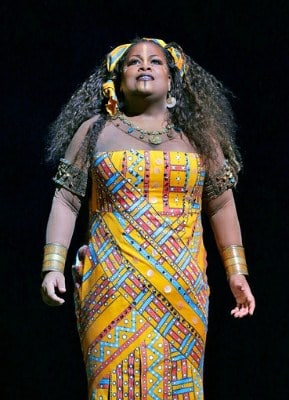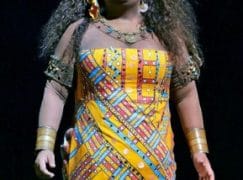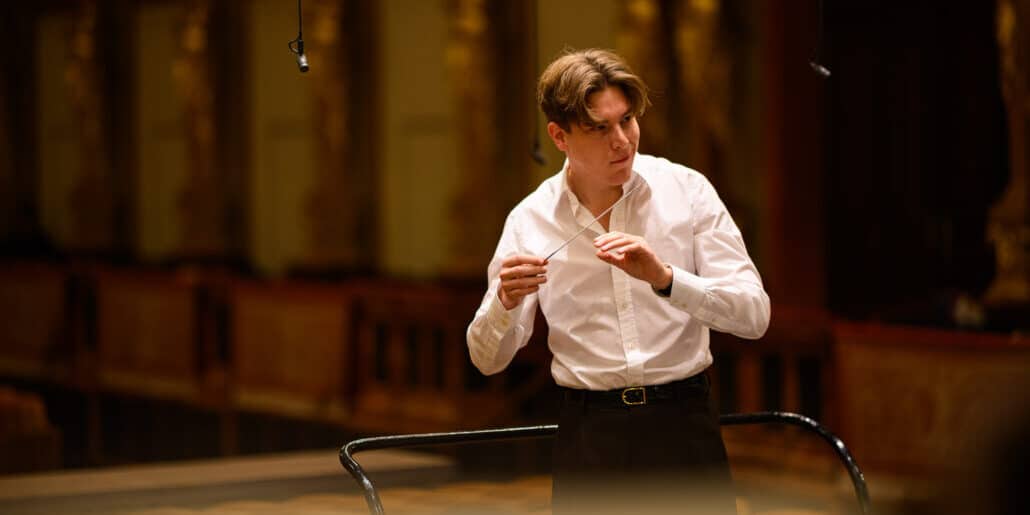ENO’s Aida: Some English words are ridiculous to sing on high notes
mainLatonia Mooore, one of the most commanding Aidas of present times, is about to make her debut at English National Opera. Latonia, like so any others, is struggling with the company’s insistence on singing in English.

UPDATE: We took this post down after Bachtrack complained at the use of their interview. Readers, however, have asked us to restore it since the comments sparked an interesting debate on opera sung in English. So it’s back.
The key quote from Latonia’s interview is: Some words were ridiculous to sing on high notes.’
Discuss.






ENO shoukd present in the otiginal languages and provide English translation. Or otherwise confine itself to works originally compised in the Englush language. Or close.
Couldn’t agree more. Heard an appalling Pearl Fishers there once — just sounded SILLY. I suppose it presented in English originally before surtitles, but there is no excuse now. And it is hard to believe that people who loved the music enough would be turned off by the original languages. I suppose it was part of the eternal effort to build audiences from the ranks of those not educated to the arts, the type that would never go to a foreign movie, etc. Forget it. The only way there will be change in appreciation of classical music is through education, as we all know.
This artist’s lament sums it all up beautifully.
The Pearl Fishers was silly all along; it’s just that it’s easier for anglophones to overlook that when it’s sung in French.
And that’s not just a glib comment. I think English-speakers have tended to overlook a lot of weaknesses on the dramatic/theatrical side of opera (very much including librettos) because we’re used to hearing operas in foreign languages anyway, so we let standards slide in a way we don’t for spoken theatre.
But when opera with a genuinely good libretto is done well in English – think Peter Grimes or Semele (or Sweeney Todd) – I find it packs a punch for me that opera in Italian or German or Russian or (usually) French just doesn’t.
That holds true as well with (for instance) the Janacek I’ve seen in English. And since he didn’t compose Puccini-style “hit tunes”, being involved with the drama is all the more important.
Is it at the ENO that Parsifal sings to the Blumenmädchen “I’ve come to penetrate your tiny bushes”?
The classic I remember was in the final duet between Rigoletto and Gilda when, on the rising 6th they had to sing “Our souls in heav’n” – twice.
Beethoven used “Gott!” (a short, hard syllable) for a languid, sustained high g. In the original language.
“I hope you will see to it that my works are performed in English; only in this way can they be intimately understood by an English-speaking audience.”
Richard Wagner (22nd October 1877)
But hey, what did he know?
I doubt he knew about surtitles. He might even agree that they render a translation of the sung text unnecessary.
Yup, I’m sure the man who designed an entire theatre specifically in order to eliminate any possible visual distraction would have *loved* having a line of badly co-ordinated luminous text flickering away above the stage
Half the reason I go to ENO is to hear it in English. If you don’t like it, there’s a pretty good alternative just down the road. Opera for me is about theatre as much as it is about music, so I like to not be reliant on a little board above the stage. I DO think it was a mistake to introduce surtitles however at ENO. It makes both the audience and singer lazy and breaks the concentration of the viewer on the stage,
many foreign films?
If you would read and consider Ms.Moore’s comments you might be inclined to toddle down the road yourself.
Otherwise, you could always get hold of a libretto if you need to know the dialogue so literally.For most of us the synopsis suffices but as you want the dialogue, read it ahead. You do not know what you are missing not to hear Verdi and Puccini and the rest in Italian, or Wagner in German, or the French in French, etc.
In films the subtitles are ON the film. They don’t require you to break your gaze. There is no right or wrong in this, it is great to have a choice. No one is forcing anyone to go to ENO. And I don’t think the singers comments suggest she doesn’t want to sing in English, just that it is harder and you have to have a great translation.
And yes, I have been to the ROH many times. For staged opera I prefer hearing it in English. If it were in concert, I’d want to hear it in the original language.
re: needing a great translation. One nice thing is that you can adjust the translation as you go, so that a word that’s difficult on a high note can hopefully be changed to one that’s easier to sing and still makes sense. She mentions doing this in the interview. (Really, on a high C anything you say is probably going to come out sounding like “ah,” so you might as well have an “ah” vowel on that note if you can.)
Yes, me too, and it’s a way in for our people who you try to introduce to opera who might otherwise not go at all. After all, opera is for everyone who wants to go, and there is an alternative for Londoners to go to and anyone else if they don’t like ENO. It’s also part of their charter to make opera accessible and in English. Ask any of the old school in Reginald Goodall and Mark Elder’s time about singing in English. They got on with it and didn’t complain. They new enough about singing that you don’t sing closed vowels with a closed mouth on high notes whatever the language. Singing Pearl Fishers in English is no more ridiculous than singing Traviata in German or Wagner in Italian – in the language of the vast majority of an audience.
It’s not the language, it’s the choice of vowels on certain notes which can be a problem. That said, there was a peach of translation of Che Gelida Manina:
Or che mi conoscete
Parlate voi
Became…
Never thought I would start out
To pour my heart out.
Cole Porter would have been proud.
Is that the same translation with the lines “Your key? Don’t mind it. It’s far too dark to find it!”
Could very well be…
If she thinks Aida shouldn’t be sung in English, why is she singing at the ENO?
Exactly. Maybe she’s going to donate her fee to charity…
I read the entire interview and didn’t see anywhere where she said (or seemed to imply) that Aida shouldn’t be sung in English. Could you point out the place? Thanks.
Exactly, plenty of British singers around who would be glad of the role to sing and not complain, and adapt the English as we singers always have to do.
Girls are made to love and kiss
And who am I to disagree with this?
Who can say?
God made me gay!
I’m a man!
And I kiss them when I can!
I’ll tolerate sung in English (providing we have surtitles!), because we still enjoy the orchestra, staging, drama and good singers; but for Italian classics like Aida who wouldn’t prefer to hear (and sing) the original. I’ll admit I’m content with Wagner in English. The Mastersinger translation a couple of years ago was great.
When, oh when, are ENO going to revisit their raison d’etre, or should I say “reason to exist”, and why are they seemingly so slow to bring many great modern American works to their stage. Surely, if anything, their reason to be should be the world’s foremost house for works written in English.
(Looking forward to seeing it tomorrow)
Trouble is, the diction is so poor that you rely on the subtitles even when it is being performed in English – so what is the point?
There are two other problems: idiotic translators who don’t understand how difficult it is to sing certain words and sounds at certain points in the singing line; and singers who wilfully mangle vowel sounds.
Michelle De Young is a conspicuous offender in the new Aida. As those who go will discover!
Whereas the ENO Mastersingers was miles better: a good, well-crafted translation, subtly updated; proper diction (presumably due to the number of rehearsals and coaching); and an opera whose very nature depends for its success on the text, and where the musical direction/tempi allowed the words to come over naturally.
Italian opera is just incredibly difficult to get right in translation – for all the reasons above.
Your tiny hand is frozen.
Often heard in pre-unified Germany as Wie eiskalt ist Dein Hähnchen.
How cold is your chicken?! How on earth…
Sadly Latonia proved her own words in this article by coming to grief at the dress rehearsal on the high C of ‘o patria mia’ which duly emerged as a shriek in the English translation, on (I think) the phrase ‘my dear country’.
Let us hope she managed to pull it off at tonight’s first night.